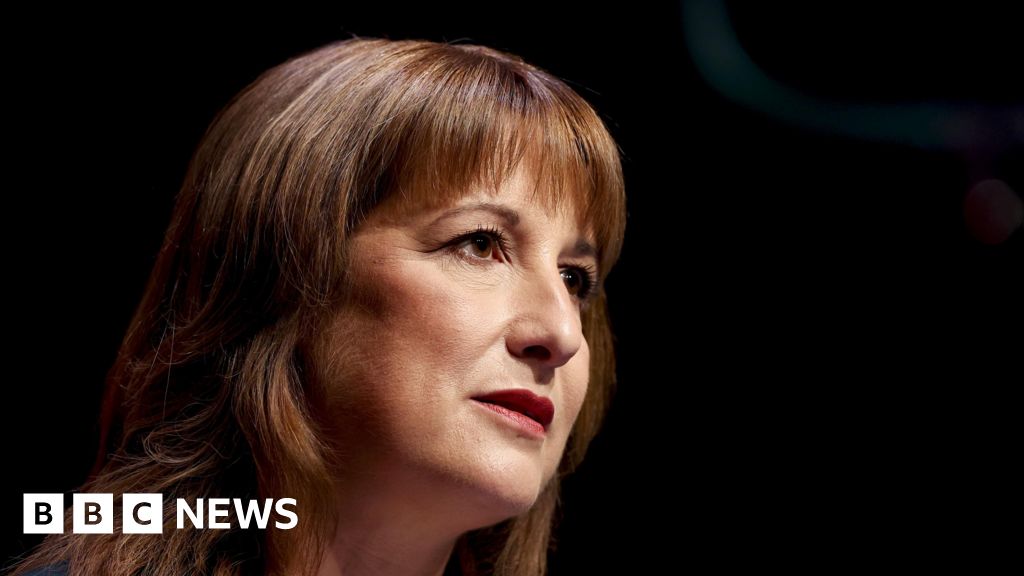Business
Rachel Reeves should avoid ‘half-baked’ tax fixes in Budget, says IFS

Chancellor Rachel Reeves should avoid “directionless tinkering and half-baked fixes” when trying to boost the government’s tax take in next month’s Budget, a leading think tank has said.
Taxes are widely expected to go up in the Budget, with pressure on the chancellor to raise money in order to meet her self-imposed rules for government finances.
However, the Institute for Fiscal Studies (IFS) – regarded as one of the UK’s most influential economic voices – has said some tax rises could be “especially economically harmful”.
The Treasury said the chancellor had been clear the Budget would strike the right balance between funding public services, while also encouraging growth and investment.
Some analysts have estimated that Reeves will have to raise tens of billions of pounds through either increasing taxes or cutting spending in order to meet her rules which she has described as “non-negotiable”.
The two main rules are:
- Not to borrow to fund day-to-day public spending by the end of this parliament
- To get government debt falling as a share of national income by the end of this parliament
Before the 2024 general election, Labour promised not to increase income tax, National Insurance or VAT for working people.
The IFS said it would be possible for the chancellor to raise tens of billions of pounds a year more in revenue without breaking these manifesto promises, but this would not be straightforward.
Its director Helen Miller told BBC’s Radio 4’s Today programme: “The politics is important and we’re going to hear lots and lots about whether Rachel Reeves can raise the money she wants without breaking one of her manifesto pledges – and that’s worth thinking about – but the economics is important too.”
The IFS said there are “serious constraints” on the next four biggest taxes – corporation tax, council tax, business rates and fuel duties – while “some other tax-raising options would be especially economically harmful”.
The IFS’s comments came in an extract from its annual Green Budget, which analyses the challenges facing the chancellor.
In it, the think tank urged wider reform to the tax system which would align “overall tax rates across different forms of income”, something it says would be “fairer and more growth friendly”.
“There is an opportunity to be bold and take steps towards a system that does less to impede growth and works better for us all,” said Ms Miller who is one of the authors of the report.
It suggests reforms to property tax and capital gains tax as “good places to start”.
Speaking to the Today programme Ms Miller said that stamp duty is an “absolutely awful tax” and said council tax, which is based on 1991 property valuations, is “ludicrously out of date” and “regressive”.
“Make it a tax based on up-to-date property values, make it proportional, and raise revenue from that rather than the current council tax and stamp duty,” she added.
The report goes on to look at a number of trade-offs the government could make in an effort to bring in more income.
It warns against a wealth tax – which it said would face “huge practical challenges”, potentially penalising savings and encouraging wealthier people to leave the country.
“If the chancellor wants to raise more from the better-off, a better approach would be to fix existing wealth-related taxes, including capital gains tax,” it noted.
It says property taxation is “an area in desperate need of reform”. It calls for a reformed council tax based on current property values, rather than the current system that “ludicrously” uses values from 1991.
Extending the current freeze on income tax thresholds, which is due to end in 2028, could raise “a significant amount”. Speaking to the BBC in September, Rachel Reeves did not rule this out.
The IFS noted that restricting income tax relief for pension contributions could potentially raise a large sum – but should be avoided as it would be “unfair and distortionary”.
It said there were “better options” for increasing tax on pensions, such as reforming the tax-free element.
A Treasury spokesperson said: “The chancellor has been clear that at Budget she will strike the right balance between making sure that we have enough money to fund our public services, whilst also ensuring that we can bring growth and investment to businesses.”
Business
Those with MGNREGA cards to get work during transition to G RAM G Act – The Times of India

NEW DELHI: People with job cards assigned under Mahatma Gandhi National Rural Guarantee Scheme will be able to get work without disruption when transition takes place to new rural employment framework under Viksit Bharat-Guarantee for Rozgar and Aajeevika Mission (Gramin) Act.Even though exact timeframe is not known yet, rural development ministry officials said the VB-G RAM G scheme will come into force in the coming financial year after the Centre frames and notifies the rules. After govt notifies the Act’s commencement date, states will get six months to make their schemes to enable implementation of the law.To ensure there is no disruption and job guarantee is upheld during transition from MGNREGA, it has been proposed to enable workers to use the same job cards issued under MGNREGA with Aadhaar-based eKYC.The officials said that as of now, around 75% of job cards have been verified with eKYC under the ongoing scheme. Moreover, ongoing projects under MGNREGA, if incomplete when the transition happens to the new scheme, would stay on course.Meanwhile, work is on to frame rules, lay out regulations on normative allocations, fund flow plan, IT framework, a national-level steering panel and social audits.Under the new law, focus will be on transparency to weed out leakages and duplicacy of work,the social audit system will be strengthened, and technology leveraged to create systems to establish work progress, timely wage payment and accountability through ‘e-measurement’ books, sources said. Demand for work will have to be entered on a digital platform. Officials made it clear the new law in no way interferes with demand-driven character of the scheme.
Business
Gurugram Attracts Rs 86,588 Crore In Real Estate Investments In 2025 As RERA Clears 131 Projects

Last Updated:
Alongside rising investments, Gurugram RERA strengthened regulatory oversight to safeguard homebuyer and investor interests

Gurgaon Real Estate (Representative Image)
Gurugram emerged as one of India’s top real estate investment destinations in 2025, with projects worth Rs 86,588 crore receiving regulatory approvals during the year, according to data from the Gurugram Real Estate Regulatory Authority (Gurugram RERA).
Market observers said the numbers reflect strong investor confidence in the NCR’s largest commercial and residential hub.
Gurugram RERA registered 131 projects in calendar year 2025, representing development potential of 35,455 units across housing and commercial segments.
A striking feature of the data was the dominance of large-ticket projects. Just 28 major developments accounted for investments worth Rs 59,360 crore, highlighting the growing influence of institutional capital and large developers in shaping Gurugram’s property market.
Residential assets continued to attract the bulk of investment interest. Of the total units approved, 31,455 were residential, underscoring sustained end-user demand and long-term confidence in the city’s housing fundamentals.
According to Authority data, the residential mix included 17,405 group housing units, 5,720 mixed land use units, 4,040 residential floor units, 2,122 affordable group housing units, 1,954 units under the Deen Dayal housing scheme, and 214 residential plotted colony units.
Market observers said this diversified supply pipeline indicates capital deployment across both premium and mass segments, helping reduce concentration risk and deepen market resilience.
On the commercial side, Gurugram RERA approved about 4,000 commercial units, of which 168 were dedicated to IT parks, reinforcing Gurugram’s position as a preferred hub for technology firms and Global Capability Centres.
Analysts noted that the combination of office-led employment growth and residential expansion continues to make Gurugram attractive for long-term capital deployment.
Industry experts said the scale of investments approved in 2025 highlights Gurugram’s ability to attract capital despite global uncertainty, supported by infrastructure growth, a strong corporate base and an improving regulatory environment.
“With a large pipeline of approved projects and sustained interest from developers and institutional investors, Gurugram is expected to remain a key real estate investment destination in the coming years,” a Gurugram-based real estate expert said.
Tighter regulatory checks
Alongside rising investments, Gurugram RERA strengthened regulatory oversight to enhance transparency and safeguard homebuyer and investor interests.
“These steps included stricter scrutiny of developer submissions, mandatory site inspections by domain experts, and public consultation through mandatory notices before project registration,” an Authority official said.
January 16, 2026, 07:44 IST
Read More
Business
National Startup Day 2026: How India’s Startups Are Shaping The Future

Last Updated:
National Startup Day highlights India’s thriving startup ecosystem, celebrating innovation, entrepreneurship and job creation driven by founders, unicorns and Startup India mission

National Startup Day 2026 honours Indian startups, entrepreneurs and innovators driving economic growth and job creation.
National Startup Day 2026: India’s startup ecosystem has evolved into one of the world’s most vibrant and promising innovation hubs. To recognise the contribution of entrepreneurs, founders and startups transforming ideas into impactful solutions, National Startup Day is observed every year on January 16 across the country.
Launched by Prime Minister Narendra Modi in 2022, the day celebrates visionary entrepreneurs who play a crucial role in economic growth, employment generation and technological advancement.
National Startup Day serves as a reminder that innovation, backed by determination and policy support, can reshape society and create global impact.
National Startup Day 2026 Theme
The official theme for National Startup Day 2026 is yet to be announced. However, the core focus areas are expected to revolve around:
- Innovation and emerging technologies
- Entrepreneurship and leadership
- Self-reliance (Atmanirbhar Bharat)
- Startup India Mission
- Youth empowerment
- Job creation
How Startups Are Shaping India’s Future
India currently ranks as the third-largest startup ecosystem globally, with over 1.59 lakh startups recognised by the Department for Promotion of Industry and Internal Trade (DPIIT) as of early 2025. Backed by 100+ unicorns, the ecosystem continues to grow rapidly.
Metro cities such as Bengaluru, Hyderabad, Mumbai and Delhi-NCR lead this expansion, while Tier-2 and Tier-3 cities are emerging as new innovation centres, adding diversity and scale to India’s entrepreneurial journey.
Startups across fintech, edtech, health-tech, e-commerce and deep-tech are addressing real-world challenges and gaining global recognition. Technologies like artificial intelligence, blockchain and IoT are increasingly driving innovation, according to Startup India ecosystem reports.
Industry-Wise Startup Impact
DPIIT-recognised startups have generated over 16.6 lakh direct jobs across sectors as of October 31, 2024, strengthening India’s employment landscape.
- IT Services: 2.04 lakh jobs
- Healthcare & Life Sciences: 1.47 lakh jobs
- Commercial & Professional Services: 94,000 jobs
Through the Startup India initiative, the government continues to focus on skill development, funding access, ecosystem collaboration and global outreach.
Key Initiatives Under Startup India
- Capacity building and mentorship
- Outreach and awareness programmes
- Ecosystem development events
- International exposure and global linkages
- Collaboration between startups, corporates and institutions.
January 16, 2026, 07:00 IST
Read More
-

 Politics1 week ago
Politics1 week agoUK says provided assistance in US-led tanker seizure
-

 Entertainment1 week ago
Entertainment1 week agoDoes new US food pyramid put too much steak on your plate?
-

 Entertainment1 week ago
Entertainment1 week agoWhy did Nick Reiner’s lawyer Alan Jackson withdraw from case?
-

 Sports5 days ago
Sports5 days agoClock is ticking for Frank at Spurs, with dwindling evidence he deserves extra time
-

 Business1 week ago
Business1 week agoTrump moves to ban home purchases by institutional investors
-

 Sports1 week ago
Sports1 week agoPGA of America CEO steps down after one year to take care of mother and mother-in-law
-

 Tech3 days ago
Tech3 days agoNew Proposed Legislation Would Let Self-Driving Cars Operate in New York State
-

 Business1 week ago
Business1 week agoBulls dominate as KSE-100 breaks past 186,000 mark – SUCH TV






